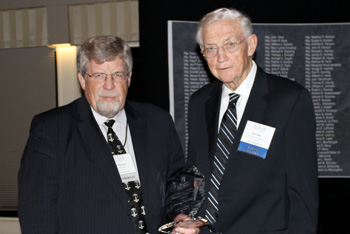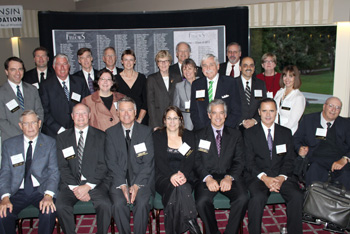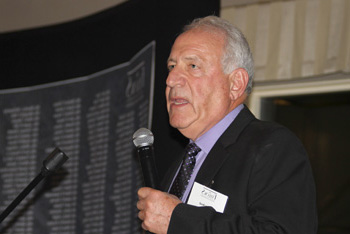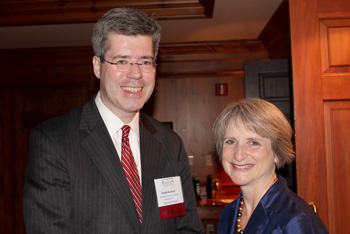Oct. 4, 2013 – Last evening, famed civil rights attorney John Doar received the Wisconsin Law Foundation (WLF) Charles L. Goldberg Distinguished Service Award, and 58 lawyers were inducted into the 2013 Class of Fellows.

Wisconsin Law Foundation President Dean Dietrich (left) presents the Charles L. Goldberg Distinguished Service Award to civil rights attorney John Doar.
Visit the State Bar of Wisconsin on Facebook for more photos of this event, or click here.
Doar received the award for his long-standing record of service to the legal profession and to the public. More than 100 guests attended the annual event in Madison. Guest speakers, Marquette Law School Dean Joseph Kearney and U.W. Law School Dean Margaret Raymond, spoke about the future of legal education in Wisconsin.
Doar Receives Award
John Doar, a native of New Richmond, received the Presidential Medal of Freedom from President Obama in 2012, the highest civilian award given by our government.
“It is very humbling to read about John Doar,” said WLF President Dean Dietrich noting Doar’s many years of service to profession and the public. “It is rare that you can read a biography and say this gentleman used his law degree and his service to do exactly what everyone of us wanted to do when we started that first day of law school … to give back not just to our community, not just to our law practice, but to give back to our country and society. The history of all that John Doar has participated in – of giving back to our country and our society and to the law – is everything the Goldberg award is meant to honor.”
Accepting the award, Doar said, “With this award, the truth is you are recognizing a small group of civil rights lawyers who worked tirelessly in the 1960s to see that the voting rights act of 1965 was passed.” Doar served as first assistant to the Assistant Attorney General of the Civil Rights Division of the Department of Justice, he prosecuted voting rights cases during a critical time of the civil rights era.
Doar recognized two Wisconsin lawyers in particular who worked tirelessly with him, “Arvid Sather and the late Richard Cates, both of these men did so much for me.”
Sather, then a new lawyer (formerly an investigato)r, responded to Doar’s request to come to Washington and help look into voting rights issues. Sather’s investigative skills played a key role tracking and identifying voter fraud. "Arvid taught all the young lawyers coming into the department how to investigate voting rights cases,” said Doar.
Doar recalled Richard Cates: “Dick came to Washington and worked tirelessly for four months as we developed the materials that led to Nixon’s resignation.” Doar served as special counsel to the U.S. House Judiciary Committee’s investigation of President Richard Nixon for the Watergate Scandal, which eventually led to Nixon’s impeachment and resignation, a position he said was first offered to and should have gone to Cates – but politics got in the way.
“My affection and admiration for both of these men is boundless,” he said.

Seated from left: Thomas G. Ragatz; Bruce D. Huibregtse; John Arthur Busch; Sarah Edelman Coyne; Joseph M. Fasi II; Ralph J. Tease Jr.; Steven A. Levine. Second row from left: David G. Peterson; James F. Boyle; Christina Plum; Julianna Ebert; Frank J. Daily; Robert L. Gegios; Patricia D. Struck. Third row from left: Joshua J. Kindkeppel; Gregory T. Everts; Joseph W. Boucher; Barbara A. Neider; Ann Marie Murphy; William T. Curran; John R. Decker; Mary Joann (Murphy) Werner. Missing from photo: Randall D. Crocker; Peter J. Fox. (Click photo to enlarge.)
Fifty-eight Fellows were inducted to the 2013 Class of Fellows; 24 attended last night’s event. A complete class roster is included below.

Jon Axelrod, president of The Fellows Board of Trustees, welcomes the 2013 Class of Fellows.
2013 Class of Fellows Inducted
This is the 14th class inducted to the Fellows program, increasing membership to 282. Fellows are elected by the Fellows Board of Trustees. The program recognizes members of the profession who are known by their peers for high professional achievements and outstanding contributions to the advancement and improvement of the administration of justice in Wisconsin.
Jon Axelrod, Fellows Board of Trustees president, welcomed the 2013 Class of Fellows, noting the character traits that this group represents. “We see a group of attorneys with excellent legal skills who zealously represent their clients. They are well schooled in the art of civility. Their integrity and commitment to the rule of law trumps all other interests, and they give back to their community not just with pro bono service but in many other activities,” he said.
Law School Deans’ Message
In recent years, commentators and critics have called for legal education reforms to address such things as rising law school costs, student debt, and practical lawyering skills. But what’s the answer?
According to Marquette Law School Dean Joseph Kearney and U.W. Law School Dean Margaret Raymond, these complex problems are not easily solved. Both addressed numerous suggestions offered in recent years while noting the practical difficulties
Raymond, who joined U.W. Law School in 2011, commented on the idea of making law school programs two years instead of three, to cut costs, an idea touted by President Barack Obama recently.

Guest speakers, Marquette Law School Dean Joseph D. Kearney and U.W. Law School Dean Margaret Raymond, spoke about the future of legal education in Wisconsin.
“A shorter program of legal education would release more lawyers into the job market, not fewer, in effect moving responsibility for the third year of legal education from law schools to you, the practicing bar,” Raymond said.
Kearney, law school dean at Marquette Law School since 2003, addressed some commentators’ view that law schools should teach less theory, and focus more on practical skills instead.
“Perhaps the essence of my view can be captured succinctly in one of my colleagues’ comments a number of years ago, in response to someone advocating still more emphasis on skills education and correspondingly less focus on doctrine or theory. He asked, ‘when did ideas stop being important in the practice of law?’.”
Watch for the Oct. 16 issue of WisBar InsideTrack for more on what these law school deans discussed on the topic of “10 Ways to Fix Legal Education.”
About the Wisconsin Law Foundation
The Wisconsin Law Foundation (WLF), founded in 1951, is the charitable arm of the State Bar of Wisconsin. WLF is a charitable and educational organization the serves to promote public understanding of the law, improvement of the administration of justice and other law-related public service through funding of innovative and creative programs that improve the vision of the American justice systems.
Fellows of the Wisconsin Law Foundation Class of 2013
Allen A. Arntsen
Robert E. Bellin Jr.
Steven M. Biskupic
Joseph W. Boucher
James F. Boyle
Patrick W. Brennan
John Arthur Busch
Justice William G. Callow
Megan Patricia Carmody
Sarah Edelman Coyne
Randall D. Crocker
William T. Curran
Frank J. Daily
Robert W. Dean
John R. Decker
Francis W. Deisinger
Julianna Ebert
Gregory T. Everts
Joseph M. Fasi II
Peter J. Fox
Robert L. Gegios
Margaret Wrenn Hickey
Harry G. Holz
Bruce D. Huibregtse
Michael F. Hupy
Kimberly A. Hurtado
Barbara J. Janaszek
Grant C. Killoran
Joshua J. Kindkeppel |
Jessica J. King
Kevin G. Klein
Steven A. Levine
Gail Ann Lione
Marsha M. Mansfield
Joseph A. Melli
John C. Mitby
Ann Marie Murphy
Mary Joann (Murphy) Werner
Barbara A. Neider
Paul R. Norman
Kenneth R. Nowakowski
Nilesh P. Patel
David G. Peterson
Thomas J. Phillips
Christina Plum
Thomas G. Ragatz
Sharren B. Rose
Robyn S. Shapiro
Richard E. Sommer
Patricia D. Struck
Ralph J. Tease Jr.
Tim R. Valentyn
John Duncan Varda
Eido M. Walny
Carol J. Wessels
Adam J. Wiensch
Ann M. Zimmerman
Thomas J. Zoesch |
Visit the State Bar of Wisconsin on Facebook for more photos of this event, or click here.
